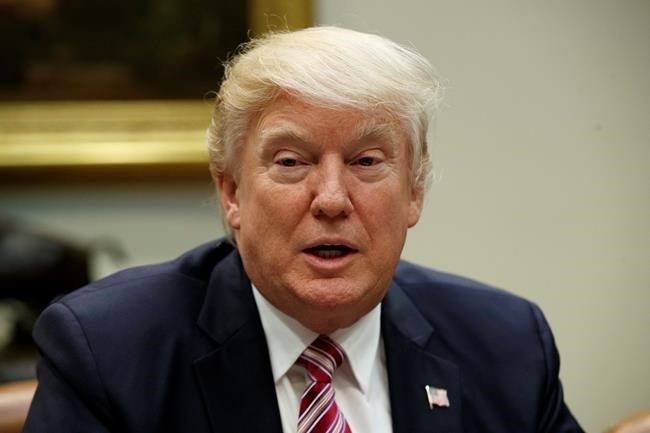
President Donald Trump speaks during a meeting on women in healthcare, Wednesday, March 22, 2017, in the Roosevelt Room of the White House in Washington.
Image Credit: AP Photo/Evan Vucci, File
March 23, 2017 - 6:00 AM
WASHINGTON - Donald Trump's personal communications were picked up by U.S. intelligence operations that were monitoring foreign espionage targets, a top Republican said Wednesday in a major twist in the real-life spy drama unfolding in Washington.
Devin Nunes, the senior congressional watchdog on U.S. intelligence agencies, made that announcement to the news media, then went straight to the White House to brief the president on what he'd found.
Nunes said he had seen dozens of intercepted communications from November, December, and January between the Trump transition team and foreign targets who were under U.S. surveillance by legally obtained security-court orders.
But he suggested the material was then improperly spread.
He offered a crisp one-word answer when asked whether Trump's own communications were picked up: "Yes," he said. Later in a news conference, he elaborated only slightly: "It was clear who was in those reports."
The dramatic events came just after the FBI announced that it had launched a criminal investigation into illegal email hacking and collusion between Russian government entities and the Trump campaign team.
For some Trump fans, this latest event was something to celebrate. To them, it proved the president's claim that he was illegally monitored by the previous president and unfairly targeted by political enemies.
Trump himself appeared to agree when asked whether he felt vindicated: "I somewhat do."
The alleged illicit activity, however, was not the intelligence collection itself, Nunes said — but the way it was subsequently spread around with the names of American citizens included in the reports.
"I think the president is concerned — and he should be," Nunes said. "There's additional unmasking of names — which I think is totally inappropriate."
Yet this isn't necessarily good for the administration.
It was this kind of dissemination of names from intercepts that cost Michael Flynn his job. He resigned as Trump's No. 1 national-security official after reports of undisclosed communication with Russia's ambassador to the U.S.
Flynn has subsequently been immersed in even hotter water.
The House intelligence committee has asked for materials related to undisclosed paid work for agencies linked to Russia's Putin government — and that news comes on the same week as reports Trump's former campaign manager, Paul Manafort, hid millions in revenues from political work for Putin.
Nunes himself shot down the idea that the revelations prove Barack Obama tapped the new president's phone.
"That never happened," he said, adding in a later CNN interview: "He's not right about that."
"It looks like it was legal collection (from espionage targets). Incidental collection... There's nothing criminal (about the collection itself)... But then it made itself into intelligence reports."
Nunes added other wrinkles to the spy story at 1600 Pennsylvania Ave.
He confirmed that he saw details that might have intelligence value. He also publicly revealed that there were multiple warrants granted by U.S. intelligence courts for surveillance targets.
Here's how American officials obtain those warrants: by convincing a Foreign Intelligence Surveillance Court that their espionage target is either a foreign power or the agent of a foreign power — and when it's a U.S. citizen, that he or she may be involved in a crime.
But Nunes also added that in the dozens of documents he read, "None of the surveillance was related to Russia, or the investigation of Russian activities, or of the Trump team."
It's unclear who selected which documents to show Nunes, and who provided them.
In the U.S., politicians are responsible for keeping a check on spy agencies. The system was created after multiple revelations of abuses of power at home and abroad by agencies like the CIA — foreign assassinations and domestic spying on political opponents caused 1970s scandals that led to the creation of intelligence committees in the Senate and House of Representatives.
Nunes is the chairman of the House committee.
It's a different system from Canada's. In Canada, the checks on potential abuses are undertaken by a citizens' body appointed by the government. Several prominent people, including former prime ministers, have called for Canada to create a parliamentary body — which exists in many countries, including the U.S.
Defenders of the U.S. system say it keeps power in a variety of hands, by involving politicians from different parties. But detractors say the system creates its own risks — one of them is the possibility that espionage oversight becomes tangled in partisan politics.
News from © The Canadian Press, 2017